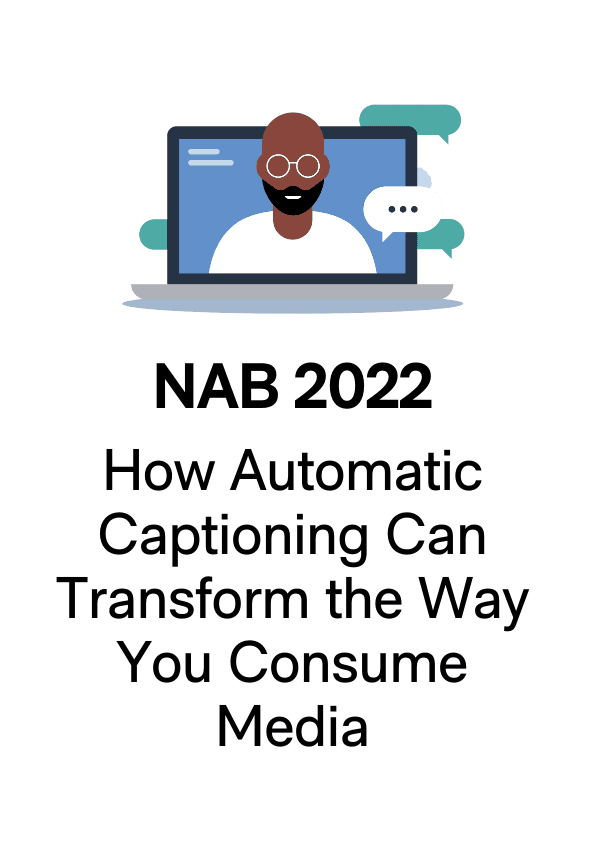- Blog
- How Automatic Captioning Can Transform the Way You...
Apr 29, 2022 | Read time 4 min
How Automatic Captioning Can Transform the Way You Consume Media
Automatic captioning's importance to the quest for accessibility in media cannot be ignored. Try our ASR for free to see why media workflows rely on speech-to-text.
As a part of our effort to spread the word and understand every voice, we travel around the globe visiting the best tech shows and exhibitions. Our team recently took Las Vegas by storm at NAB Show, proudly displaying our industry-leading Autonomous Speech Recognition (ASR) engine. Each year, thousands of businesses from all areas of the media and entertainment industries attend to show off how they're changing their market.
Given the vast array of speech-to-text use cases, we were keen to highlight how vital our ASR is for greater accessibility in media. We showcased our live demo, presenting how automated transcription can save time and money for captioning, and other media use cases, such as digital asset management, media monitoring, and keyword spotting.
From the conversations we shared with fellow AI companies, to the keynote speeches and the hundreds of demos, we learned a lot about how accessibility in the media industry is becoming crucial.
Why Accessibility in Media is Dated
Do you ever watch the news with captions on and realize they are a few seconds too slow? That's because, in many instances, shows are captioned in real-time. News captions are delayed during a live broadcast because, behind the scenes, a stenographer listens to the broadcast and types into a program that converts text into captions. As you can imagine, that requires superhuman accuracy and speed rolled into a time consuming, labor-intensive job.
Scripted shows typically add captions after filming. Caption writers listen to the soundtrack and keep a close eye on the script to add words and sound effects. For example, you might have seen something like "audience laughing" or "talks foreign language" on the hit 90s sitcom Friends.
In 2022, these captioning processes feel outdated. That's where ASR comes into play.
The news, for example, needs to be accessible in case of emergency. Delayed and incorrect captioning can confuse viewers and send out false messages. With high levels of accuracy, our ASR significantly reduces the chances of error. Combining our wide-ranging additional features, including Advanced Punctuation (inputting commas, periods, and more) and Entity Formatting (turning words into numbers) means the captions we provide are consistent and accurate. We can also boast ASR delivered in 33 languages.
If NAB taught us one thing, however, it's how far-reaching speech-to-text can be, particularly within media and entertainment.
The Future of Storytelling
In Las Vegas, it was great to see NAB's main stage had live captioning throughout provided by ENCO. Accessibility in media shows no signs of slowing down as we move toward an access-for-all content era.
Automatic speech recognition for captioning enables media (and non-media) businesses to add captions to the content they previously may not have due to time and money constraints. More focus can then go into production, and broadcasters can comply with FCC regulations which are becoming increasingly stringent.
Without accurate automatic speech-to-text at the core of most media workflows, companies are left without searchable data, captions, and archived content. Look beyond the workplace, and you'll find young people prefer having captions on. The BBC reported research that found four in five 18–25-year-olds said they "use subtitles all or part of the time."
It's no surprise that, according to NAB, AI in the media and entertainment market will reach an estimated $8.4 billion by 2023. The future of storytelling is an accessible one.
Perfect Transcription is Becoming Vital
There is little to no margin for error when it comes to captions. Not everyone can hear audio, so they need to be perfect. Again, speech-to-text has many use cases beyond media and entertainment, so there are more risks. A misspell can waste time in the workplace or cause vital errors in a doctor's notes. Or, less severely, your car might select the wrong song.
However, given the capabilities of modern AI, such as Speechmatics' ASR, the benefits are worth the risk. In cinema, for example, Hollywood dominates most of the world, but international films often struggle in America. This is partly due to the unwillingness to read captions and because they aren't always accurate. Perfect captioning allows more films to globalize – a trend seen with the Oscar-winning South Korean movie Parasite.
Accessibility in media is an ongoing journey. In AI's quest for inclusivity, it's clear just how critical speech-to-text is and will remain.
NAB showed us media and entertainment's promising growth, and we fully expect to play a pivotal part.
See why Speechmatics’ ASR is proving vital to media and entertainment’s growth by trying it for free today.